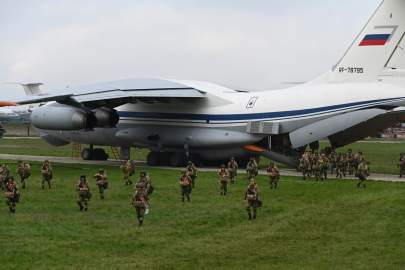Russian Forces Near Ukraine Are Still a Threat, U.S. Says
Russia has kept a heightened military presence near the Ukrainian border despite announcing the withdrawal of the troops it deployed last month, the U.S. and its NATO allies said, leading to concerns in Washington about Moscow’s intentions.

Russia’s military buildup, which it says was for defensive exercises, sparked concerns of a repeat of Moscow’s invasions of Ukraine in 2014, which severely damaged its relations with the West. Moscow announced a pullback late last month but has since withdrawn only some troops and equipment, a U.S. official said.
The continued heavy Russia military presence near Ukraine’s borders and in Crimea, which Russia annexed in 2014, maintains pressure on an ex-Soviet neighbor that Moscow considers part of its sphere of influence. It also raises the stakes for Western efforts to bring Ukraine closer to the North Atlantic Treaty Organization and the European Union.
U.S. Secretary of State Antony Blinken was set to arrive in Ukraine on Wednesday in a show of support.
Russia has kept a heightened military presence near the Ukrainian border despite announcing the withdrawal of the troops it deployed last month, the U.S. and its NATO allies said, leading to concerns in Washington about Moscow’s intentions.
Russia’s military buildup, which it says was for defensive exercises, sparked concerns of a repeat of Moscow’s invasions of Ukraine in 2014, which severely damaged its relations with the West. Moscow announced a pullback late last month but has since withdrawn only some troops and equipment, a U.S. official said.
The continued heavy Russia military presence near Ukraine’s borders and in Crimea, which Russia annexed in 2014, maintains pressure on an ex-Soviet neighbor that Moscow considers part of its sphere of influence. It also raises the stakes for Western efforts to bring Ukraine closer to the North Atlantic Treaty Organization and the European Union.
U.S. Secretary of State Antony Blinken was set to arrive in Ukraine on Wednesday in a show of support.
“If Russia chooses to act recklessly or aggressively, we’ll respond,” Mr. Blinken told a news conference Monday at a meeting in London of top diplomats from the Group of Seven leading industrialized democracies. “But we’re not looking to escalate.”
As well as seizing Crimea in 2014, Russia carved out two statelets in Ukraine’s east that other countries haven’t recognized. The conflict there has cost more than 14,000 lives, and low-level fighting continues on front lines largely fixed by a 2015 cease-fire deal.
Last month, Russia deployed tens of thousands of troops around Ukraine and in Crimea in what it called a combat-readiness check. Russian Defense Minister Sergei Shoigu called an end to the exercises on April 22 and said the troops would return to their permanent bases by May 1. He ordered arms and equipment to be stored at a training area near Voronezh, some 100 miles from the Ukrainian border, saying they would be used in a large exercise later in the year.
A NATO official said that Russia had pulled back some of the tens of thousands of troops it had massed near Ukraine, but that many remained, as well as significant numbers of weapons.
“So Russia’s military presence remains higher than it was before the recent escalation,” the official said.
The Russian Defense Ministry didn’t respond to a request for comment.
Moscow said the exercises in April were defensive, accusing NATO of building up forces near Russia. A senior Ukrainian official said the Russian drills looked more like preparations for an assault campaign, including the rapid transfer of troops to the area where they could link up with equipment. Russia already had tens of thousands of troops in Crimea and bases around Ukraine, some of which have been constructed since 2014.
“The threat is still there,” the senior Ukrainian official said. “Everything is being prepared so that a final decision could be taken like that,” he added, snapping his fingers.
Russia has also introduced restrictions on the movement of ships in some parts of the Black Sea until October. Moscow says it is conducting naval exercises. Ukraine says the aim is to choke its ports and place economic pressure on the government.
The G-7 foreign ministers expressed concern about the developments in a joint statement.
“We express our deep concern over Russia’s actions to block access to parts of the Black Sea, including near illegally-annexed Crimea and the Kerch Strait, impeding access to Ukraine’s ports in the Sea of Azov,” the ministers said. “It is critical that Moscow now fully withdraws its forces and takes the necessary steps to help alleviate tensions.”
A second Ukrainian official said Russian President Vladimir Putin was playing a long game, waiting for Western support for Ukraine to waver.
The U.S. is eager to help Ukraine counter Russian aggression and deal with its domestic problems, including corruption, the U.S. official said ahead of Mr. Blinken’s trip.
The U.S. has expressed concerns that Western-backed efforts to overhaul Ukraine’s financial and economic governance faced threats after the head of the state gas company was removed last month.
Photo: Russian paratroopers during maneuvers in Taganrog, near the border with Ukraine.
PHOTO: /ASSOCIATED PRESS
Link: https://www.wsj.com/articles/russian-forces-near-ukraine-are-still-a-threat-u-s-says-11620223524











